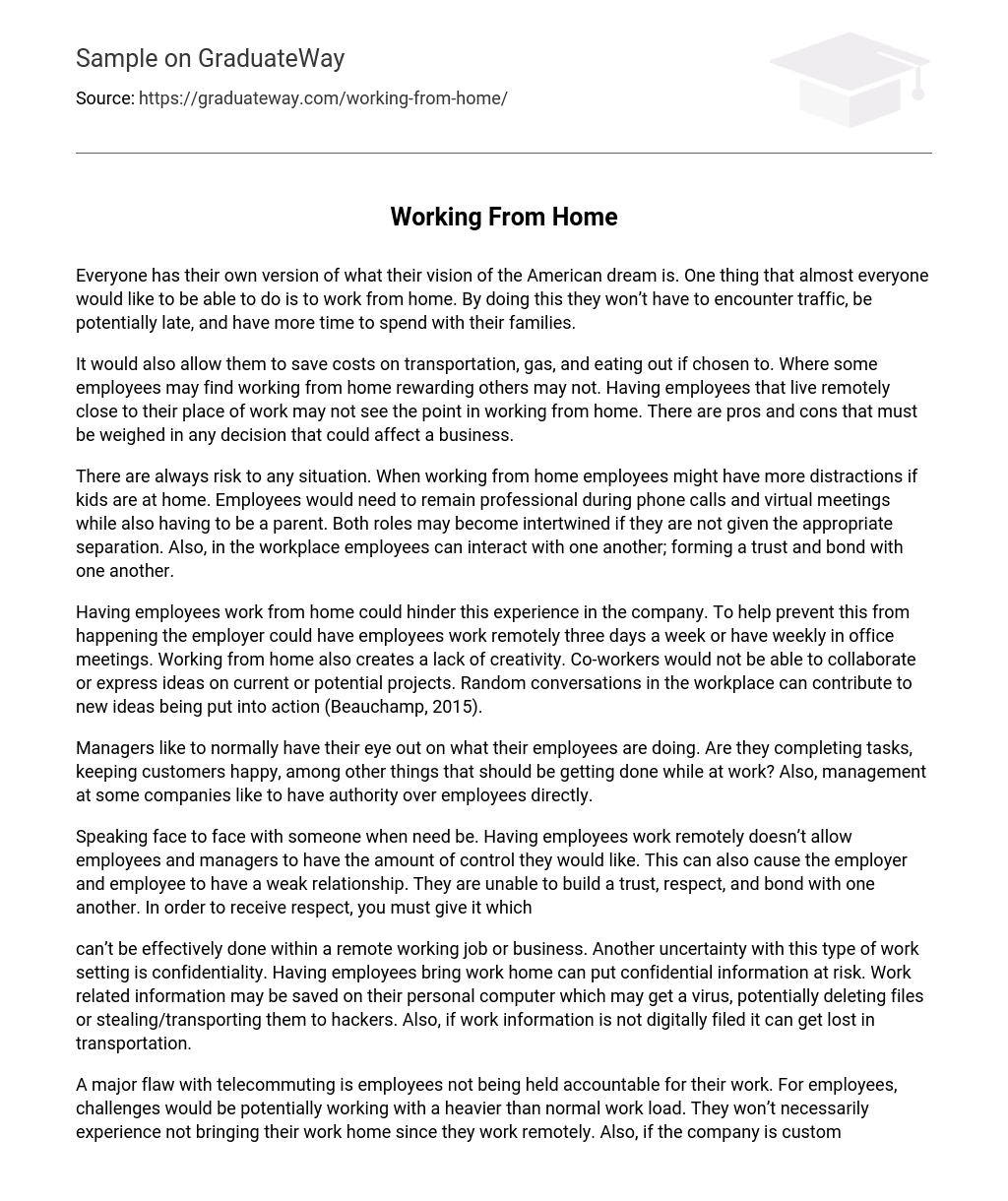Everyone has their own version of what their vision of the American dream is. One thing that almost everyone would like to be able to do is to work from home. By doing this they won’t have to encounter traffic, be potentially late, and have more time to spend with their families.
It would also allow them to save costs on transportation, gas, and eating out if chosen to. Where some employees may find working from home rewarding others may not. Having employees that live remotely close to their place of work may not see the point in working from home. There are pros and cons that must be weighed in any decision that could affect a business.
There are always risk to any situation. When working from home employees might have more distractions if kids are at home. Employees would need to remain professional during phone calls and virtual meetings while also having to be a parent. Both roles may become intertwined if they are not given the appropriate separation. Also, in the workplace employees can interact with one another; forming a trust and bond with one another.
Having employees work from home could hinder this experience in the company. To help prevent this from happening the employer could have employees work remotely three days a week or have weekly in office meetings. Working from home also creates a lack of creativity. Co-workers would not be able to collaborate or express ideas on current or potential projects. Random conversations in the workplace can contribute to new ideas being put into action (Beauchamp, 2015).
Managers like to normally have their eye out on what their employees are doing. Are they completing tasks, keeping customers happy, among other things that should be getting done while at work? Also, management at some companies like to have authority over employees directly.
Speaking face to face with someone when need be. Having employees work remotely doesn’t allow employees and managers to have the amount of control they would like. This can also cause the employer and employee to have a weak relationship. They are unable to build a trust, respect, and bond with one another. In order to receive respect, you must give it which
can’t be effectively done within a remote working job or business. Another uncertainty with this type of work setting is confidentiality. Having employees bring work home can put confidential information at risk. Work related information may be saved on their personal computer which may get a virus, potentially deleting files or stealing/transporting them to hackers. Also, if work information is not digitally filed it can get lost in transportation.
A major flaw with telecommuting is employees not being held accountable for their work. For employees, challenges would be potentially working with a heavier than normal work load. They won’t necessarily experience not bringing their work home since they work remotely. Also, if the company is customer based, they won’t have an office number for people to leave messages. This problem can be resolved however, if the company distributes work phones to employees (Patterson, Harvey, and Bosco, 2014).
Working from home can help boost sales due to the environment being different. Employees are in the comfort of their own home where it is quieter. They can remain focused on the tasks at hand. Allowing employees to work remotely can motivate them to work longer hours. They will not be taking as long of breaks and starting their workday earlier. There would be no commute, running errands on break would decrease, and request fewer sick days (Berinato, 2014).
Working from home within a company that either has a lot of projects or tasks for people to complete can be stressful. Due to the actual office space not being obtained regularly. A few ways to improve this type of situations are making sure the employees know exactly what they are supposed to be doing even while working remotely.
If there is more than one person in a group project, an email detailing what needs to b done in order to complete the project should be sent to everyone involved. This can improve with weekly staff meetings as well. Ambiguity can occur if decisions are not being made precisely which can slow down production. Self confidence can be instilled into employees from management to prevent self-doubt. Making sure
specific employees are assigned to specific tasks they may specialize in can prevent ambiguity from occurring. Although, employees will be working remotely; training should be completed every few months to make sure they can handle situations appropriately and effectively. Training exercises with specific work-related scenarios makes employees think on their feet. They won’t be in a work setting where they can go get someone else to help the customer.
The company will also be able to see how much their employees know and remember about services or products they should be offering to the public. Lastly, companywide goals should be set regardless of the work setting set in place. When goals are reached and employees are rewarded, they are reminded of it being a team effort, even while working remotely (McFarlin, 2019).





